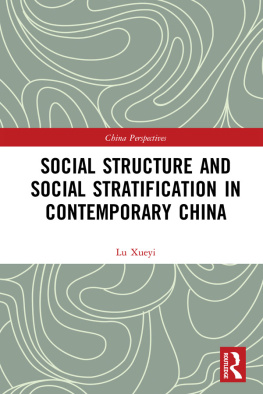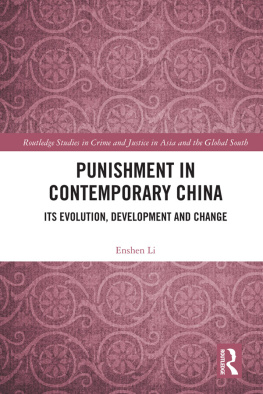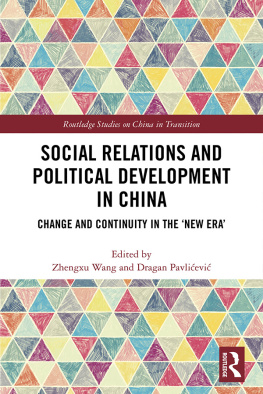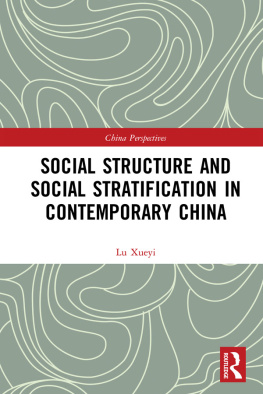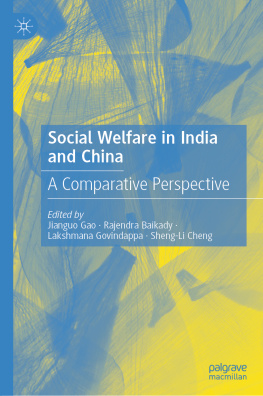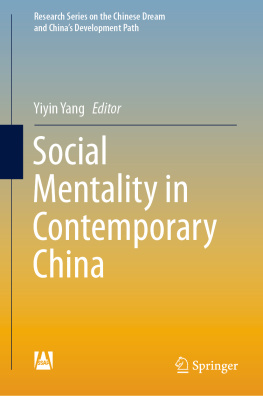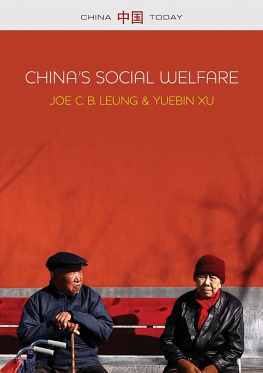Lu Xueyi - Social Construction and Social Development in Contemporary China
Here you can read online Lu Xueyi - Social Construction and Social Development in Contemporary China full text of the book (entire story) in english for free. Download pdf and epub, get meaning, cover and reviews about this ebook. year: 2020, publisher: Taylor & Francis Group, genre: Politics. Description of the work, (preface) as well as reviews are available. Best literature library LitArk.com created for fans of good reading and offers a wide selection of genres:
Romance novel
Science fiction
Adventure
Detective
Science
History
Home and family
Prose
Art
Politics
Computer
Non-fiction
Religion
Business
Children
Humor
Choose a favorite category and find really read worthwhile books. Enjoy immersion in the world of imagination, feel the emotions of the characters or learn something new for yourself, make an fascinating discovery.
Social Construction and Social Development in Contemporary China: summary, description and annotation
We offer to read an annotation, description, summary or preface (depends on what the author of the book "Social Construction and Social Development in Contemporary China" wrote himself). If you haven't found the necessary information about the book — write in the comments, we will try to find it.
Lu Xueyi: author's other books
Who wrote Social Construction and Social Development in Contemporary China? Find out the surname, the name of the author of the book and a list of all author's works by series.
Social Construction and Social Development in Contemporary China — read online for free the complete book (whole text) full work
Below is the text of the book, divided by pages. System saving the place of the last page read, allows you to conveniently read the book "Social Construction and Social Development in Contemporary China" online for free, without having to search again every time where you left off. Put a bookmark, and you can go to the page where you finished reading at any time.
Font size:
Interval:
Bookmark:
The successful publication of this collection is the result of the close collaboration between Mr. Lu Xueyis students, the translator, and the colleagues at China Social Sciences Press. Thanks should be given to Ms. Gao Ge , Mr. Lus assistant, and Mr. Yan Ye , Mr. Lus student, for providing explanations and additional notes necessary for the English edition. A word of thanks should also be given to Sun Yanwen , the colleague at China Social Sciences Press, who has shown unfailing patience and offered professional support for the translation work. Special thanks should be given to Yan Peng Wittrock , the translator of this collection, for her rigorous and meticulous work and never ceasing to follow academic standards in the course of translation. She has made numerous helpful suggestions to make the English version more suitable for readers outside China, most of which have been incorporated in the final version of the translation.
Editor
Beijing, April 2019
A study on basic ideas and strategies for establishing a new urban housing system
On April 5, 1980, Deng Xiaoping delivered a speech on housing system reform in China and provided an overall plan with the objectives, tasks, and steps of reform. In 16 years since then, significant progress has been made in the housing system reform in cities and towns. Nationwide, the pace of the reform has been accelerated and the content of the reform deepened, especially after the third work conference on housing reform in 1993 and the issuing by the State Council of the Decision on Deepening the Urban Housing Reform in 1994. Dramatic breakthroughs have been achieved with respect to setting up the system of housing provident funds (HPF ), steady sales of public-owned housing, and the promotion of rent reform. The results are remarkable. We have now reached the crucial stage of realizing the transition from the old to a new urban housing system.
A countrys long-term stability requires the building of a whole set of basic systems conforming to the national conditions. These basic systems include political, economic, military, and cultural systems. They are supported by a series of other important systems and institutions, such as those of education, science and technology, personnel, land, enterprise, housing, and so on. The housing system is not only an important part of the economic system, but also that of the social system. Live and work in peace and contentment (). This cannot be realized without comfortable housing. Thus, the adjustment of the housing system through reform is an important dimension of ensuring a countrys long-term stability.
The housing system in rural areas in contemporary China has been built by farmers themselves, and the houses are for use and owned by farmers themselves. This is in line with Chinas basic national conditions, and with the wishes of the broad masses of farmers. As a result, farmers housing has been greatly improved in recent years, with almost no state financing and the government has not put much thought into it. When it comes to the housing system for urban residents, due to historical reasons, we have adopted the policies of allocating land free of charge, using public funds for construction and management of housing, free distribution, and a system in which residents pay very little rent. The implementation of these policies has led to heavy state investment (at present, 100 billion yuan annually). Cadres at all levels have devoted a great deal of time and energy to it. Nevertheless, the housing problems of urban residents have not been satisfactorily solved. In 1994, the living area of urban residents was only 7.9 square meters per person. There were more than 400 million households that lacked housing. Urban residents had a lot of complaints about the housing problem, which led to multiple social problems.
Comfortable housing gives a family a sense of security; building a housing system based on self-ownership can lighten the burden of the state and is conducive to social stability. Housing itself is a commodity with a dual nature. It is both a durable commodity and an asset with value-maintaining and value-increasing functions. For urban employees, housing self-ownership can bring stability not only to their daily lives, but also to their psychology.
Those with constant means of support have also constancy in heart ( ). Take farmers as an example; with the land use and management rights, they will have the ability and base to weather some degree of economic fluctuation.
Looking back at the processes of opening up and reform in the past 18 years, comparatively speaking, rural reform has been relatively smooth, whereas urban reform has been more difficult. Right from the beginning of the rural reform, the household contract responsibility system was introduced. The broad masses of farmers were granted autonomy, and benefited substantially from it. This brought the initiatives of farmers into full play, which led in turn to a series of changes in the countryside. Although the reforms and development in rural areas have gone through twists and turns in recent years, rural society is on the whole stable, and agriculture is developing. Continued progress has been made in the rural economy. In 19891990, over 10 million farmers, who had moved to cities and worked for many years, were sent back to their hometowns when the state carried out macro adjustment and control. No country could do this easily without causing multifaceted problems, but it was done successfully in the rural areas in China. No major problem occurred. What made this possible? It was made possible because migrant workers had 1.5 mu of contracted land, which provided them with the basic means of support. This means that over 10 million people have the ability and base to withstand economic fluctuations. The society has maintained stability. This is an important experience to bear in mind.
In contrast to the rural reform, urban reforms have encountered great difficul-ties and gone through difficult twists and turns. The reform of large and mediumsized state-owned enterprises, of the institutional frameworks, as well as of the personnel, medical care, pension, and housing systems, have all met with difficul-ties. Why has it been so difficult? Putting aside other aspects, the following two factors are of special importance. First, reform entails the proper handling of the relationship between giving and taking. The experience of Chinese statesman in ancient times was to give first and then get. As the saying goes, Give in order to take (,). The success of any reform depends on the support and backing of the people. Reforms can be motivated and successful only when the majority of people know that it will bring them tangible or visible benefits. The secret of success in the rural reform has been that farmers obtained autonomy and benefits from it. In contrast, urban reforms in recent years have not drawn sufficiently on this basic experience. People have been made to contribute to the medical system reform, and employees required to pay their bit for the reform of unemployment insurance and the pension system. The same goes for the housing system reform. When the rent raising scheme was first implemented, employees were asked to pay a little more. No doubt, in the long run, these reforms are beneficial to the employees and masses, but practical interests affect the grassroots enthusiasm even more. The work to provide incentives for the people has fallen short, and hence, some of the reforms have been carried out without the support of the majority of the people. The employees do not have the same strong incentive for reform as farmers had, which has made it difficult to carry out the reform programs.
Second, the capacity of the masses to cope with the reforms needs to be taken into consideration. For a long time, China implemented the low-wage policy (many benefits were tacitly provided to employees through welfare programs). In recent years, a small number of people have become rich whereas the living conditions of most employees have been improved only moderately. They are not well-off and have meager family assets. According to the sample survey by relevant parties, in 1994, the average number of color TV sets per household in urban areas was 0.86, refrigerators 0.62, radios 0.72, cameras 0.3, and bicycles 2. In addition, there were some furniture and clothes. In families of intellectuals, there were also some books. The total value of these belongings, even if calculated at the original price of the purchase, amounted only to around 20,000 yuan . Under normal circumstances, it was not a problem to maintain daily life by wage income in spite of meager family assets, but at times of great economic setbacks, it was difficult for them to get by. For individuals and families under market economy conditions, there is always a chance that these kinds of twists and turns occur. For instance, enterprises may need to lay off staff and workers. Say a working couple over 40 are both laid off. How will this family support itself? The current housing reform will enable most employees to own their housing, and the families of the laid-off employees will have the capacity to withstand economic fluctuations with margins for recovery. This is beneficial for the government and enterprises, as well as for individuals.
Font size:
Interval:
Bookmark:
Similar books «Social Construction and Social Development in Contemporary China»
Look at similar books to Social Construction and Social Development in Contemporary China. We have selected literature similar in name and meaning in the hope of providing readers with more options to find new, interesting, not yet read works.
Discussion, reviews of the book Social Construction and Social Development in Contemporary China and just readers' own opinions. Leave your comments, write what you think about the work, its meaning or the main characters. Specify what exactly you liked and what you didn't like, and why you think so.

